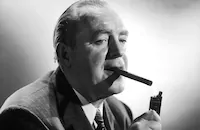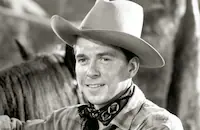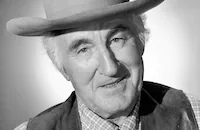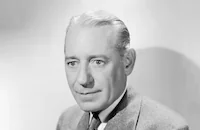Knute Rockne--All American

Brief Synopsis
Cast & Crew
Lloyd Bacon
Pat O'brien
Gale Page
Ronald Reagan
Donald Crisp
Albert Basserman
Film Details
Technical Specs

Synopsis
In 1892, Lars Knutson Rockne leaves Norway for America, in search of a better life for his family. The Rockne family settles in Chicago, where little Knute becomes fascinated by football. Years later, now grown to manhood, Knute finally saves enough money to enroll in Notre Dame, where he excels in chemistry and football. With his roommate Gus Dorais, Knute develops the famous football strategy of the forward pass and defeats the Army team. After graduation, Knute stays on at Notre Dame, teaching chemistry and coaching football to earn enough money so that he can marry his sweetheart Bonnie Skiles. After three years, Knute decides to give up chemistry and make coaching his life work. The legendary Notre Dame team finally comes together when Knute finds his half-back in freshman George Gipp. However, tragedy dims the team's triumph when Gipp is stricken with a fatal illness. After Gipp's death, Knute revolutionizes football with the backfield shift of his "Four Horsemen," thus winning further glory for his school. Later, crippled by phlebitis, Knute is forced to coach from a wheel chair, but never loses his team spirit. The real threat that Knute must face is not his phlebitis but the allegation of scholastic favoritism in college football. While flying to a hearing in California to defend his beloved sport, Knute tragically loses his life in a plane crash, but his good works live on in the sport that he strove so hard to build.

Director

Lloyd Bacon
Cast

Pat O'brien

Gale Page

Ronald Reagan

Donald Crisp

Albert Basserman

John Litel

Henry O'neill

Owen Davis Jr.

John Qualen

Dorothy Tree

John[ny] Sheffield
The Moreau Choir Of Notre Dame
Nick Lukats
Kane Richmond
William Marshall
William Byrne
Howard Jones
Glenn "pop" Warner
Alonzo Stagg
William "bill" Spaulding
Billy Sheffield
Ruth Robinson
Cliff Clark
Richard Clayton
George Haywood
Carlyle Moore Jr.

George Reeves
Peter Ashley
Michael Harvey
Gaylord Pendleton

George Irving
Harry Hayden
Charles Trowbridge
Charles Wilson

John Ridgely
Jeffrey Sayre
Joe Cunningham
De Wolfe Hopper
David Bruce
Frank Mayo
Dutch Hendrian
Davis Roberts
Egon Brecher
Fred Vogeding
Phil Thorope

Dickie Jones
George Billings
William Haade
Eddy Chandler
Pat Flaherty
Creighton Hale

John Gallaudet

Lee Phelps

James Flavin
Tommy Bennett

Donald Curtis
Robert Winkler
Danny Jackson
Gary Watson
Harry Harvey Jr.
Ruth Toby
Dudley Dickerson
Wade Boteler

Pierre Watkin
Ed Stanley
Frank Coghlan Jr.
Owen King
Edgar Dearing
Erville Alderson

Maris Wrixon
Lucille Fairbanks
Tommy Baker
Peter B. Good
Bunky Fleischman
David Dickinson
Jack Grant Jr.
David Wade
Billy Dawson
Billy Gratton
Patricia Hayes
Crew
Don Alvarado
Milo Anderson
Frank Anthony
Robert Buckner
Ralph Dawson
Robert Fellows
Leo F. Forbstein
Tony Gaudio
Robert Haas
J. A. Haley
Byron Haskin
Ray Heindorf
Jesse Hibbs
Charles Lang
Nick Lukats
Jack L. Warner
Perc Westmore
Rex Wimpy

Photo Collections
Videos
Movie Clip



Trailer
Hosted Intro
Film Details
Technical Specs

Articles
Knute Rockne-All American - Knute Rockne, All American
Reagan almost didn't get the part at all. The young actor, a featured contract player but not a major star at Warner Brothers studio, was inspired by the story of Rockne, the Norwegian immigrant who served as head coach of the Fighting Irish of Notre Dame from 1918 to 1930, racking up the greatest all-time winning percentage with 105 victories, 12 losses, 5 ties and 6 national championships. But beyond this impressive career, Reagan was most taken with the father-son relationship between the coach and Gipp. One of the all-time great stars of the sport, the young player died of pneumonia just two weeks after his final game. Reagan desperately wanted to see Rockne's story on film - with himself as the Gipper. He haunted every office on the lot for months, telling his idea to anyone who would listen, questioning the best way to go about getting the project going. One day, he heard that the studio had in fact planned a production and was already considering a number of other young actors for the part, including William Holden, John Wayne, Robert Young, Robert Cummings and - thanks to a successful test - frontrunner Dennis Morgan. Reagan rushed into a producer's office, begging for a shot at the role but was told he wasn't believable as one of the greatest football players of all time. Finally, he went home and dug up photos of himself as a college player and convinced the producer to give him a screen test. He was lucky enough to test not with some stand-in, the usual practice, but with star Pat O'Brien himself, in full Rockne make-up, a gesture for which Reagan was always grateful to the older actor.
O'Brien, however, wasn't a shoo-in for the part either, much as he wanted and campaigned for it. Casting the beloved Rockne was a difficult task. The coach's distinctive image and style were still fresh in everyone's minds, having died tragically only nine years earlier in a plane crash at the age of 43. The studio was leaning toward James Cagney, its biggest male star and box office champion; Cagney thought the role would get him out of the gangster typecasting he'd fallen into in the 1930s. But the actor had also quite openly supported the anti-Franco (and by implication, anti-Catholic) Republican cause in the Spanish Civil War, so Notre Dame and church officials nixed him as a choice. Warners also considered Spencer Tracy, but couldn't get him on loan from MGM. O'Brien's heavy lobbying finally paid off, although executives still had concerns about the 40-year-old actor pulling off the scenes where his character is a younger man. Giving in to O'Brien as the prime choice for the role, Associate Producer Bob Fellows nevertheless dropped a memo to Executive Producer Hal Wallis in January 1940 suggesting they get the actor into a trainer's hands: "If he would be willing to cooperate, I know we could get those double chins off and knock 10 or 15 years off his looks." Apparently, O'Brien went along with the idea, getting the role of his career and becoming indelibly connected with Rockne in the mind of the public. (Cagney, by the way, finally got his chance to break the gangster mold and counter the image concerns brought on by his political stances by playing the most American of all roles in Yankee Doodle Dandy, 1942).
Several real-life sports figures appeared as themselves in the picture, including Glenn "Pop" Warner, for whom pee-wee football leagues are named. And the film contains actual newsreel footage of Notre Dame football games. It is also one of only two movies to be filmed on the university campus. The other was Rudy (1993).
In 1997, Knute Rockne All American was chosen by the National Film Preservation Board to be one of the movies preserved in the Library of Congress National Film Registry.
Director: Lloyd Bacon
Producers: Hal B. Wallis, Robert Fellows
Screenplay: Robert Buckner
Cinematography: Tony Gaudio
Editing: Ralph Dawson
Art Direction: Robert Haas
Original Music: Heinz Roemheld (uncredited)
Cast: Pat O'Brien (Knute Rockne), Gale Page (Bonnie Skiles Rockne), Ronald Reagan (George Gipp), Donald Crisp (Father Callahan).
BW-99m. Closed captioning.
by Rob Nixon

Knute Rockne-All American - Knute Rockne, All American
Ronald Reagan, 1911-2004 - TCM Remembers Ronald Reagan
Ronald Reagan, the actor turned elected official whose fascinating career saw him develop as a contract player for Warner Brothers studios, to a politician who fulfilled his ambitions by becoming the 40th President of the United States, died at his home in Los Angeles on June 5 after a long battle with Alzheimer's disease. He was 93.
He was born Ronald Wilson Reagan on February 6, 1911 in Tampico, Illinois to John and Nelle Reagan. When Reagan was nine, his family settled down in the small community of Dixon, about 100 miles west of Chicago. After high school, Reagan enrolled in Eureka College, a small Christian school near Peoria. He graduated in 1932 with a degree in Economics, and pursued a career in broadcasting. His first gig was as a part-time announcer at WOC in Davenport, Iowa. Within a year, WOC had merged with its big-sister station, WHO in Des Moines, and Reagan was hired as a sports announcer.
In the spring of 1937, Reagan drove to Southern California to catch the Chicago Cubs in spring training on Santa Catalina Island. While he was in California, he wrangled a screen test and signed a contract for $200 a week with Warner Brothers. His film debut was rather inauspicious; he portrayed a radio announcer in an innocuous comedy Love is on the Air (1937). He made a few more "B" programmers like Hollywood Hotel (also 1937), and Girls on Probation (1938), before getting his first prominent role opposite Bette Davis in the popular tearjerker, Dark Victory (1939).
Although he seldom got credit for being a good actor, there was no denying that Reagan held his own given the right material: Knute Rockne, All American as the doomed Notre Dame football hero George "The Gipper" Gipp, where he delivered the film's immortal line "Win one for the Gipper!"; Santa Fe Trail in which he ably supports Errol Flynn in one of the boxoffice hits of its era (both 1940); Kings Row (1941), featuring one of his finest performances as a small-town playboy whose legs are amputated by a careless surgeon; and Desperate Journey (1942) where he again supported Flynn in an exciting action picture.
Due to his poor eyesight, Reagan didn't see any action in World War II, so the studio heads assigned him to star in a series of patriotic films produced by the First Motion Picture Unit of the Army Air Forces in Culver City. Between 1942-45, Reagan starred in over 400 of these films. After the war, Reagan still found some good roles: The Voice of the Turtle (1947) proved he had a deft hand at light comedy opposite Eleanor Parker; The Hasty Heart (1949) offered another underrated performance as he ably portrayed the Yank in John Patrick's much heralded wartime play; and Storm Warning (1950) was a slick melodrama that cast Reagan as a crusading District Attorney determined to bring the KKK in a small southern town, with the help of Doris Day and Ginger Rogers!
It was around this time that Reagan became involved in politics. In 1947, he began a five-year term as president of the Screen Actors Guild (SAG), and testified in October of that year before the newly formed House Un-American Activities Committee (HUAC). He identified suspected Communists Larry Parks, Howard Da Silva and Alexander Knox, all of whom were subsequently called to testify, and subsequently blacklisted. Later records showed Reagan was so concerned about the Communist influence in Hollywood, that he became an FBI informer.
As Reagan became steeped in his political career, his parts throughout the '50s became inferior: the notorious Bedtime for Bonzo (1951); the coy "sex" comedy She's Working Her Way Through College (1952) that cast him as a college professor who romances a stripper! (Virginia Mayo); Cattle Queen of Montana (1955), a sluggish Western that even the redoubtable Barbara Stanwyck couldn't save; and finally Hellcats of the Navy (1957), a stodgy war picture that would be his only film that co-starred his wife Nancy (Davis).
Television offered some salvation. For eight years, (1954-62), Reagan served as the host of General Electric Theater, a televised series of dramas. He also found a niche as GE's goodwill ambassador to employees and to civic and business groups around the country, furthering his taste and honing his craft as a public official. By the mid '60s, Reagan would move into politics entirely, save for one last film, the thrilling The Killers (1964), Reagan's only known villainous role, as a murderous gangster. That same year, he actively campaigned for Republican Presidential candidate Barry Goldwater, although Goldwater lost to Lyndon B. Johnson.
Reagan whose profile was riding high, had cemented his future as a successful politician. In 1966, he ran against incumbent Governor Pat Brown for the state of California and won, serving successfully for two terms until 1974.
Reagan began an all-out, two-year drive to wrest the 1976 nomination from incumbent Gerald R. Ford, an appointed vice president who became president on the resignation of Nixon. Reagan fell short by a handful of delegates to the Republican national convention. But Ford lost to Jimmy Carter, and Reagan became the front-runner to challenge Carter in 1980. After defeating Carter, Reagan held two terms as President of the United States (1981-89). After his second term was over, he retired quietly in California. In 1994, it was revealed to the media that Reagan was suffering from Alzheimer's disease; he had been kept out of the public eye since then.
He was married briefly to actress Jane Wyman (1940-48), and had two children; a daughter Maureen and an adopted son, Michael. In 1952, he married a budding film starlet, Nancy Davis, who bore him two more children; a daughter, Patty; and a son, Ronald Jr. Ronald Reagan is survived by Nancy, Michael, Patty and Ron Jr. His daughter Maureen died of Melanoma in 2001 at the age of 60.
by Michael T. Toole
Ronald Reagan, 1911-2004 - TCM Remembers Ronald Reagan
Quotes
Now I'm going to tell you something I've kept to myself for years. None of you ever knew George Gipp. He was long before your time, but you all know what a tradition he is at Notre Dame. And the last thing he said to me, "Rock," he said, "sometime when the team is up against it and the breaks are beating the boys, tell them to go out there with all they've got and win just one for the Gipper. I don't know where I'll be then, Rock," he said, "but I'll know about it and I'll be happy."- Knute Rockne
Win one for the Gipper!- George Gipp
Trivia
'Holden, William' , 'Wayne, John' , 'Young, Robert' , and 'Cummings, Robert' were considered for the role of George Gipp, but only Dennis Morgan and 'Reagan, Ronald' tested for it, with Morgan having the edge until the last minute.
James Cagney, eager to break out of gangster roles, lobbied hard for the part of Knute Rockne. But Cagney had signed a petition in support of the anti-Catholic Republican government in the Spanish Civil War. Notre Dame University had control over all aspects of the filming and would not okay Cagney for the role.
One of only two movies to be filmed on the University of Notre Dame campus. The other was Rudy (1993).
Notes
The working titles of this picture were All American, The Spirit of Knute Rockne, The Story of Knute Rockne, The Fighting Irish, Laughing Irish Hearts and The Life of Knute Rockne. The opening credits read "Based upon the private papers of Mrs. Rockne and the reports of Rockne's associates and friends." The Variety review notes that football coaches Howard Jones, Glenn "Pop" Warner, Alonzo Stagg and William Spaulding, who appeared as themselves in the film, were friends of Rockne. According to news items in Hollywood Reporter, John Payne was originally considered for the lead role. William K. Howard began the direction of the film, but was replaced by Lloyd Bacon because of a difference of opinion with Warner Bros. over the treatment of the story. Modern sources suggest that these differences centered around a death scene in which Howard wanted Rockne to convert to Catholicism. Hollywood Reporter items add that technical adviser Nick Lukats was a former Notre Dame football star and that the film was shot on location at Notre Dame at South Bend, IN. The line "win just one for the Gipper" that is spoken by Ronald Reagan, who plays George Gipp in the film, became Reagan's trademark and he often mentioned it during his presidency. The entire speech reads, "Some day when the team's up against it...breaks have beaten the boys...ask them to go in there with all they've got...win just one for the Gipper. I don't know where I'll be then but I'll know about it. I'll be happy." In 1940, Pat O'Brien and Ronald Reagan starred in a Lux Radio Theatre version of the story. The 1931 Universal film, The Spirit of Notre Dame, was also based on the life of the athletic coach (see AFI Catalog of Feature Films, 1931-40; F3.4259), produced by M-G-M TV.

Miscellaneous Notes
Released in United States 1940
Released in United States July 1984
Selected in 1997 for inclusion in the Library of Congress' National Film Registry.
Released in United States 1940
Released in United States July 1984 (Shown at FILMEX: Los Angeles International Film Exposition (50 Hour Sports Movie Marathon) July 5-20, 1984.)















